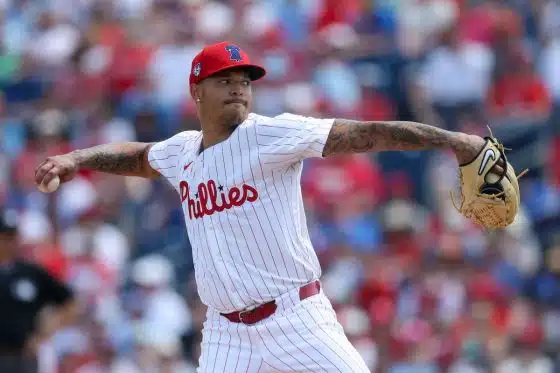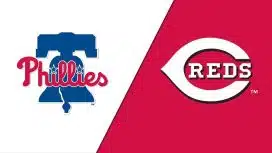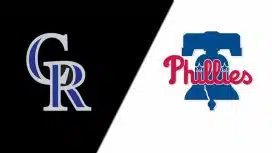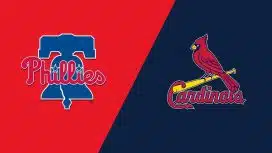By Tim Kelly, Sports Talk Philly editor
This July, Philadelphia Phillies Wall of Famer Jim Thome will be inducted into the Baseball Hall of Fame. He will go in as a Cleveland Indian, as he should, but his first stint in Philadelphia was noteworthy nonetheless. The same this will likely be true for the late Roy Halladay, who figures to be a first-ballot induction in 2019 as a member of the Toronto Blue Jays, one summer after being inducted onto the Phillies Wall of Fame. Even the ever-controversial Curt Schilling remains on the ballot. Schilling's numbers dictate him being a Hall of Famer, though even if he is ultimately elected, it's unclear if he'll go in as a member of the Phillies, Arizona Diamondbacks or Boston Red Sox.
So who will be the next person to go into the Hall of Fame as a member of the Phillies?
Bobby Abreu, who will become eligible for the first time in 2020, would most certainly go into the Hall of Fame as a Phillie. On the surface, even suggesting Abreu as a Hall of Famer may seem like a reach, but his case is actually much stronger than one may think.
What is working in his favor?
Perhaps the three most important metrics for measuring a candidate's Hall of Fame worthiness to new school voters are bWAR (a player's career WAR as calculated using Baseball Reference's formula), WAR7 (a player's WAR during the peak seven years of their career) and JAWS (a statistic created by FanGraphs' Jay Jaffe that, in an oversimplified world, compares candidates to Hall of Famers at their positions).
Abreu actually tops 2018 inductee Vladimir Guerrero in all three categories. Here's a list of Hall of Fame right fielders that he tops in terms of all three statistics: Elmer Flick, Enos Slaughter, Willie Keeler, Sam Rice, Harry Hooper, Kiki Cuyler, Chuck Klein, Sam Thompson and King Kelly. It is fair to respond to that by saying that Hall of Fame standards today are much higher than they were in previous decades – Klein wouldn't be a Hall of Famer, in all likelihood, if he appeared on a ballot now – though it does work to prove that Abreu's case deserves further examination. His WAR7 of 41.6 even tops Hall of Fame right fielders Tony Gwynn, Dave Winfield, Paul Waner and Sam Crawford.
Popular: At This Juncture, Would Reacquiring Cole Hamels Make Sense For Phillies?
With each passing year, there are more and more voters at least willing to factor advanced metrics into the Hall of Fame equation, which can't be said for more "traditional" voters. That helps Abreu. Though none of Abreu's counting statistics jump off the page, they are all pretty impressive. A .291 career batting average, 2,470 career hits and 400 stolen bases are among the counting statistics that at least make Abreu worthy of a deeper look. And a deeper look usually means sabermetrics, which are friendly to Abreu.
It also doesn't hurt that after beginning his career in Houston, he broke out in Philadelphia, produced (in entirely different roles) for both New York teams and also played for both Los Angeles teams. Former Phillies closer Billy Wagner – who has an interesting Hall of Fame case himself – told SportsTalkPhilly.com that a writer once told him that he wouldn't vote for Trevor Hoffman for the Hall of Fame because he played on the West Coast. Though there may be less of a bias against players who don't play in the region that a voter covers in the internet age, Abreu played all over the country. He doesn't have to worry about losing voters in a big market because they are unaware of his body of work.
What is working against him?
While Abreu may top Guerrero in terms of bWAR, WAR7 and JAWS, Guerrero made seven more All-Star teams than him, won seven more Silver Slugger Awards and won a league MVP. Abreu, perhaps because he played much of his career during the Steroid Era, never finished in the top 10 in MVP voting.
Of course, Guerrero being elected to the Hall of Fame doesn't also mean that Abreu couldn't eventually be elected too, but in addition to an accolades advantage, Guerrero had more non-measurable things going for him.
Abreu, despite winning a Gold Glove Award in 2005, wasn't well-regarded as a fielder. The fact that he finished his career with a -141.3 dWAR backs up his reputation as a less-than-stellar fielder. The fact is, with most voters – especially those that are undecided – Abreu's fielding will be a wash. They won't take the time to take a deep dive on his fielding one way or another. But for someone that will struggle to garner serious consideration from at least a percentage of voters despite his offensive resume, Abreu may have needed a reputation as an elite fielder to have a more serious case.
Guerrero never won a Gold Glove Award and finished his career with a -115.0 dWAR. Defensive runs saved wasn't track until 2003, his final year with the Expos, but he had -25 of those in his career. By just about all metrics, Guerrero wasn't a good fielder. But those who were on the fence about his Hall of Fame case were much more likely to remember the historically strong arm that he possessed, rather than the fact that generally speaking, he wasn't a good fielder. He was fun in that way, pushing many voters to want to vote for him for the Hall of Fame. When fringe voters thought about Guerrero, they didn't think of the fact that some of his advanced statistics were a bit short of what modern Hall of Fame right fielders have, they thought of his historically strong arm and him hitting pitches off the plate out of the park.
Long story short, Guerrero getting elected to the Hall of Fame on his second year on the ballot is unlikely to have many ramifications on Abreu's case. But Guerrero had some things going for him that Abreu doesn't.
Top 25 Players To Ever Play A Game For The Phillies: No. 18, Bobby Abreu
There will be a sabermetrics crowd that eventually forms to make a push for Abreu, but he'll be down a list of players that said crowd has made it their mission to make a case for. Edgar Martinez, for example, is in the final year of Hall of Fame eligibility in 2019 and came within five percent of gaining election this year. Martinez will be off the ballot before Abreu becomes eligible, but there are still other cases in front of Abreu's. Abreu's former teammate Scott Rolen received just 10 percent of the vote in 2018, his first year on the ballot, despite the fact that he has a higher bWAR, WAR7 and JAWS than the average Hall of Fame third baseman. Two of Abreu's other former teammates, the aforementioned Billy Wagner and Curt Schilling, are also years into their time on the ballot.
Heck, Larry Walker has the exact same bWAR as the average Hall of Fame right fielder, while topping the average Hall of Fame rightfielder in WAR7 and JAWS. He made five All-Star teams, won an MVP, won seven Gold Gloves and three batting titles. And yet, he received his highest total of the vote (34.1 percent) in 2018, his eighth year on the ballot. Walker has just two remaining years on the ballot, and needs to get from 34.1 percent to 75. It's just difficult to see him bridging that gap. Perhaps the Modern Era Baseball Committee or the Veterans Committee will eventually re-examine his case, but if he isn't able to come close to election in his 10 years on the general ballot, what does that say about Abreu's chances?
In the end, Abreu, like Walker, may fall victim to the lazy, yet oft-used "Hall of Famer or not" test. In an interview on Pardon My Take last April, Schilling said that if a candidate's name is mentioned and you don't immediately think "he's a Hall of Famer," you shouldn't vote for him. This, of course, is a very flawed way of assessing someone's Hall of Fame worthiness. It sets a bias against worthy players who don't play in huge markets (Walker would be an example of this) and towards players who may fall short, but were key parts of teams that consistently made postseason runs (Jack Morris comes to mind).
The truth is, getting to vote for the Hall of Fame is an honor. Those bestowed with that honor should treat it like a 400 level college class every year. There should be countless hours spent evaluating each player on the ballot to determine if they are worthy of election. Unfortunately, there are enough voters who just glance down the list and decide on name or base their votes on outdated metrics. Abreu, who wasn't a prolific home run hitter, didn't play on a team that made a memorable postseason run and never came particularly close to winning an MVP, will never be given much of a chance by those voters.
The Verdict
There's still two years until Abreu becomes eligible for Hall of Fame voting. Between now and then, regardless of how you feel about his Hall of Fame case, Abreu deserves to be inducted onto the Phillies Wall of Fame. Whether Hall of Fame voters ultimately decide that he's worthy of being elected to the Hall of Fame, or even garnering serious consideration, remains to be seen.
Outfielders on the Hall of Fame ballot have seen mixed results in recent years. As alluded to in much of this article, Guerrero, despite falling short according to some metrics, will be enshrined this summer. Walker, despite not really falling short in any category, may be gaining voting traction too late in his time on the ballot. Andruw Jones – who was one of the greatest fielding center fielders in baseball history and a Hall of Fame caliber all-around player at his peak – managed to remain on the ballot with 7.3 percent in his first year on the ballot. His swift decline makes him unlikely to ever gain serious traction, though Kenny Lofton's one-year stay on the ballot put more of a spotlight on the case of Jones.
We'll know soon enough how Abreu fits into that equation, but from here, he doesn't deserve to be altogether dismissed.





